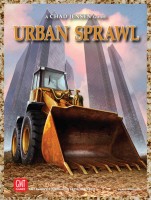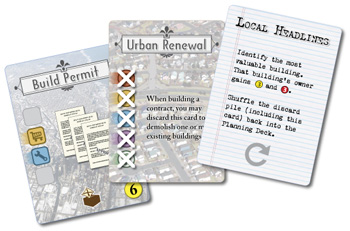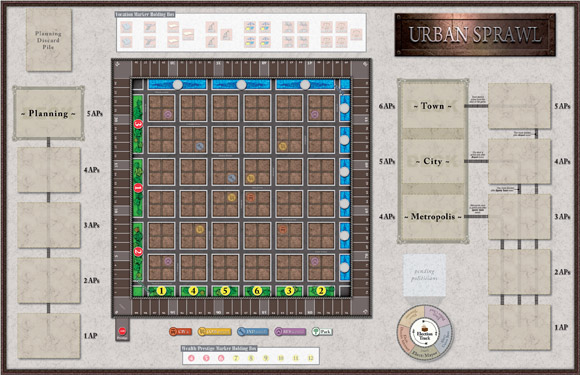
Urban Sprawl
Urban Sprawl abstractly models the growth of a town into a teeming metropolis.

Players assume the roles of entrepreneur, tycoon and politician—each helping in the development of a hypothetical “Anywhere, USA.” Wealth and Prestige will be earned and spent throughout the game. Buildings will rise only to later be demolished for better and larger fare.
Throughout the game, players will gather valuable Permits. These will result in either a wealthy Investment or the foundation of a new building Contract. Players will strive to become dominant in one or more building Zones in order to acquire beneficial political offices.
All of this eventually leads to the end game – a vibrant metropolis that is revered around the world – when the player with the most Prestige will be crowned the winner.

User Reviews (1)
Add a Review for "Urban Sprawl"
You must be logged in to add a review.

My first impression when I saw Urban Sprawl was: “Well, is it the SimCity computer game transfered to a board?” The answer turned to be: “To a degree.” This is a 2-4 player game about building a city.
The players construct buildings of four types (industrial, residential, commercial and civic) so they form appropriate districts and thus the town is developed into a city and later into a metropolis. They also receive rewards for things they have built before.
The game mechanics combines a number of standard elements that can be found in other games. What we can find there is: gaining and spending action points; earning, accumulating and spending money; taking various roles; taking decisions how to use a particular resource, as most of the game elements have more than one use. While all these mechanics elements work quite well together, they set the entry threshold moderately high: it’s not a “sit down and play it at once” game. It is perhaps easier to comprehend than Through the Ages or Dungeon Lords, and it takes less time to do all the in-game bureaucracy than it is required for those to games. Yet some kind of internal rules consistency that is present in TtA and DL seems to be missing in Urban Sprawl…
What I’ve found particularly interesting and appealing in this game is the way the districts (represented by board sectors) change their prestigious and financial reward values throughout the game. This emulates changing preferences and trends among the inhabitants. Clever, really. Another interesting feature is a possibility to demolish a few buildings to make some space for new ones. Most games would have only offered upgrading those old buildings in such a situation.
As for the game components: they are simple and useful but not of superb quality or astonishing beauty. But, well, Puerto Rico has similar components and it is a great game nevertheless…
Two weird final remarks:
– It is said that the town in question is “somewhere in the USA”. Judging by the number of permits to obtain to proceed with construction, as well as the way elections are resolved, I’d rather say “somewhere in the USSR”.
– The game-ending event is “Olympic Games”. Well, surely expenses necessary to prepare such en event may ruin any city. No need to play any more.